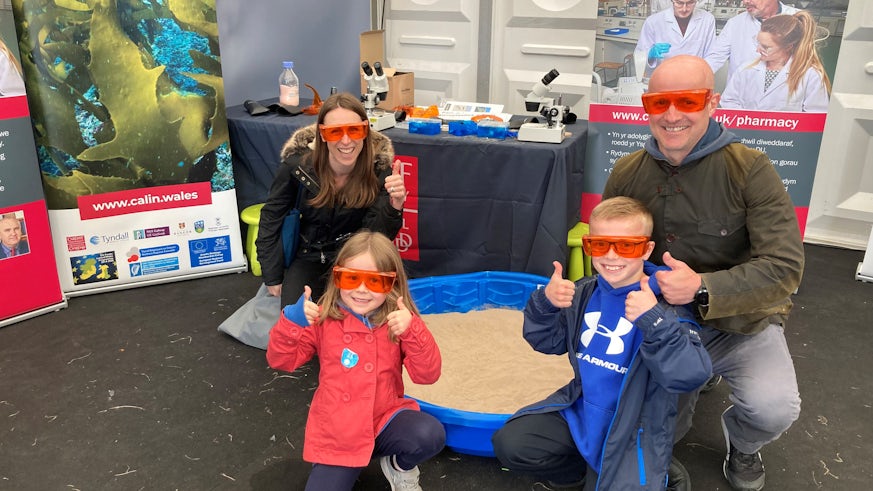New public engagement project travels to the Urdd Eisteddfod
30 June 2022

On May 30th and 31st the School of Pharmacy and Pharmaceutical Sciences took a new public engagement project to the Urdd Eisteddfod to discuss the problem of plastic pollution and its effects on our environment. The project, funded by CALIN and also supported by the Cardiff University Engage and Inspire Seed-Corn Fund, highlights the issue of microplastics in our environment. Such plastics are mostly invisible to the naked eye as they often merge with the colours of natural sand on beaches; it is a growing problem that needs attention.
To make plastic more visible for this new public engagement project, Dr Iwan Palmer added a dye called Nile Red to a sand sample. This substance attaches to plastic but not the surrounding sand. When viewed through orange-tinted goggles and excited with blue light the plastic fluoresces, allowing observers to see just how much plastic is hidden in environments like our beaches.

“It’s always great for me to have the opportunity to engage the public in science, particularly young children. The issue of plastic pollution is a very serious one, but one that’s very much in the consciousness of the public, thanks mainly to Sir David Attenborough’s fantastic Blue Plant II series,” said Dr Palmer of the new project.
The Urdd National Eisteddfod is one of Europe’s largest youth touring festivals with around 90,000 visitors each year, and the microplastics activity attracted over 1,000 people in the two days it was present. The activity was created in collaboration with The Young Darwinian, a company which provides educational workshops and kits and publishes a scientific journal for young people. It’s possible to adapt the activity to make a simple introduction to those just beginning their journeys in education, through to school leavers more interested in chemistry, physics and the environment. The ultimate aim of the project is to educate the public on how important it is to stop plastic getting into the seas in the first place, by literally highlighting the problem.

It’s always a pleasure to see how informed some young people are about issues such as this and how excited they all get when they have the opportunity to take part in scientific activities. The opportunity to do this through the medium of Welsh at an event such as the Urdd National Eisteddfod is also an added bonus for me as a proud Welsh speaker
Whilst a link between plastic pollution and pharmaceutical research might not seem obvious at first, the oceans are a rich source of new medicines. To date over 40,000 compounds that could have medicinal properties have been discovered beneath the waves. Drugs such as Ara-A for treating viral infections, Ara-C for cancer and AZT for HIV were all discovered in marine organisms, and this represents only the tip of the iceberg. Protecting our oceans and the organisms that dwell within them is essential for continued medical advances.
Working with the Cardiff University Eisteddfod team Dr Palmer and his colleague Professor Arwyn T Jones were delighted with the engagement the public of all ages showed in the activity. They now hope to expand this work to reach a much wider audience in the near future. Iwan and Arwyn will be running this activity at the National Eisteddfod of Wales in Tregaron from 30th July to August 2nd and would be delighted to see you there.
